- Home
- Jonathan Stroud
The Golem's Eye Page 6
The Golem's Eye Read online
Page 6
“You promised me!”
“Whose bat is it? Whose ball?”
Despite Kitty’s protests, natural law prevailed, and Jakob took up position in front of the drinking fountain. Kitty walked a little way off, rubbing the ball against her shorts in the way that bowlers did. She turned and looked toward Jakob with narrow, appraising eyes. He tapped the bat against the grass, grinned inanely, and wiggled his bottom in an insulting manner.
Kitty began the run-up. Slowly at first, then building up pace, ball cupped in hand. Jakob tapped the ground.
Kitty swung her arm up and over and loosed the delivery at demonic speed. It bounced against the tarmac of the path, shot up toward the drinking fountain.
Jakob swung the bat. Made perfect contact. The ball disappeared over Kitty’s head, high, high into the air, so that it became nothing but a dot against the sky … and finally fell to earth halfway back across the park.
Jakob did a dance of triumph. Kitty considered him grimly. With a heavy, heartfelt sigh, she began the long trudge to retrieve the ball.
Ten minutes later, Kitty had bowled five balls and made five excursions to the other side of the park. The sun beat down. She was hot, sweaty, and irate. Returning at last with dragging steps, she pointedly tossed the ball on the grass and flopped herself down after it.
“Bit knackered?” Jakob asked considerately. “You almost got the last one.”
A sarcastic grunt was the only reply He proffered the bat. “Your go, then.”
“In a minute.” For a time, they sat in silence watching the leaves moving on the trees, listening to the sound of occasional cars from beyond the wall. A large flock of crows flew raucously across the park and settled in a distant oak.
“Good job my grandmama’s not here,” Jakob observed. “She wouldn’t like that.”
“What?”
“Those crows.”
“Why not?” Kitty had always been a little scared of Jakob’s grandmama, a tiny, wizened creature with little black eyes in an impossibly wrinkled face. She never left her chair in the warm spot of the kitchen, and smelled heavily of paprika and pickled cabbage. Jakob claimed she was 102 years old.
He flicked a beetle off a grass stalk. “She’d reckon they were spirits. Servants of the magicians. That’s one of their preferred forms, according to her. It’s all stuff she learned from her mum, who came over from Prague. She hates windows being left open at night, no matter how hot it gets.” He put on an aged, quivering voice.” ‘Close it up, boy! It lets the demons in.’She’s full of things like that.”
Kitty frowned. “You don’t believe in demons, then?”
“Of course I do! How else d’you think the magicians get their power? It’s all in the spell books they send over to get bound or printed. That’s what magic is all about. The magicians sell their souls and the demons help them in return—if they get the spells right. If they don’t, the demons kill ’em dead. Who’d be a magician? I wouldn’t, for all their jewels.”
For a few minutes, Kitty lay silently on her back, watching the clouds. A thought occurred to her. “So, let me get this right…” she began. “If your dad, and his dad before him, have always worked on spell books for magicians, they must have read a lot of the spells, right? So that means—”
“I can see where you’re going with this. Yeah, they must have seen stuff, enough to know to keep well clear of it, anyway. But a lot of it’s written in weird languages, and you need more than just the words; I think there are things to draw, and potions and all sorts of horrid extras to learn, if you’re going to master demons. It’s not something anybody decent wants to be part of; my dad just keeps his head down and makes the books.” He sighed. “Mind you, people have always assumed my family is in on it all. After the magicians fell from power in Prague, one of my grandpapa’s uncles was chased by a mob and thrown from a high window. Landed on a roof and died. Grandpapa came to England soon after and started the business again. It was safer for him here. Anyway …” He sat up, stretched. “Whether those crows are demons, I very much doubt. What would they be doing sitting in a tree? Come on—” He tossed her the bat. “Your turn, and I bet I get you out first ball.”
To Kitty’s vast frustration, this was exactly what he did. And the next time, and the next. The park rang with the metallic bong of cricket ball on drinking fountain. Jakob’s whoops resounded high and low. At last, Kitty threw down the bat.
“This isn’t fair!” she cried. “You’ve weighted the ball, or something.”
“It’s called sheer skill. My turn.”
“One more go.”
“All right.” Jakob tossed the ball with an ostentatiously gentle underarm throw. Kitty swung the bat with savage desperation, and to her vast surprise made contact so firmly that she jarred her arm up to her elbow.
“Yes! A hit! Catch that one if you can!” She began a dance of victory, expecting to see Jakob pelting off across the lawn … but he was quite stationary, standing in an uncertain posture and gazing up into the sky somewhere up behind her head.
Kitty turned and looked. The ball, which she had contrived to swipe high up over her shoulder, plummeted serenely out of the sky, down, down, down, behind the wall, out of the park, into the road.
There followed a terrible smash of breaking glass, a squeal of tires, a loud, metallic crump.
Silence. A faint hissing sound from behind the wall, as of steam escaping from a broken machine.
Kitty looked at Jakob. He looked at her.
Then they ran.
Hard across the grass they went, making for the distant bridge. They ran side by side, heads down, fists pumping, not looking back. Kitty was still holding the bat. It weighed her down; with a gasp she tossed it from her grip. At this, Jakob gave a gulping cry and skidded to a halt.
“You idiot! My name’s on it—” He darted back; Kitty slowed, turned to watch him pick it up. As she did so, she saw, in the middle distance, an open gate in the wall, leading to the road. A figure in black limped into view; it stood in the center of the gateway, looking into the park.
Jakob had seized the bat and was coming on again. “Hurry up!” she panted, as he fell in alongside. “There’s someone …” She gave up, hadn’t the breath to speak more.
“Almost there—” Jakob led the way past the edge of the lake, where flocks of wild fowl squawked and plumed out in fear across the water; under the shadows of the beech trees, and up a slight rise toward the metal bridge. “We’ll be safe … once we’re over … hide in the craters … aren’t far now …”
Kitty had a strong desire to look behind her; in her mind’s eye she saw the figure in black running after them across the grass. The image gave her a crawling sensation down the skin on her spine. But they were going too fast for it to catch them; it would be all right, they were going to get away.
Jakob ran up onto the bridge, Kitty following. Their feet pounded like jackhammers, sending up a hollow clatter and the hum of vibrating metal. Up to the top, down the other side …
Something stepped from nowhere onto the end of the bridge.
Jakob and Kitty both cried out. Their headlong rush came to an abrupt halt; they stopped dead, crashing hard against each other in their supreme, instinctive effort to avoid colliding with the thing.
It stood as tall as a man, and indeed carried itself as if this were so, standing upright on two long legs, with arms outstretched, and fingers clasping. But it was not a man; if anything, it looked more like a horribly distorted kind of monkey, oversized and very stretched. It had pale green fur across its body, except around its head and muzzle, where the fur grew dark green, almost black. The malevolent eyes were yellow. It cocked its head and smiled at them, flexing its tapering hands. A slender ribbed tail thrashed behind it like a whip, making the air sing.
For a brief moment, neither Jakob nor Kitty could speak or move. Then …
“Back, back, back!” This was Kitty; Jakob was dumbstruck, rooted to the spot. She grasped the collar of
his shirt and pulled him, turning as she did so.
Hands in pockets, tie tucked neatly into a moleskin waistcoat, a gentleman in a black suit stood blocking the other exit from the bridge. He was not the slightest bit out of breath.
Kitty’s hand remained clawed in Jakob’s collar. She could not let him go. She faced one way, he the other. She felt his hand reach out and, scrabbling at the fabric of her T-shirt, clutch it fast. There was no sound but their terrified breathing and the swishing of the monster’s tail through the air. A crow passed overhead, cawing loudly. Kitty heard blood pounding in her ears.
The gentleman did not seem in a hurry to speak. He was fairly short, but stocky and of powerful build. His round face had, at its center, an uncommonly long, sharp nose and, even in those moments of abject terror, suggested to Kitty something of a sundial. The face seemed without expression.
Jakob was trembling at her side. Kitty knew he would not speak.
“Please sir—” she began hoarsely. “W-what do you want?”
There was a long pause; it appeared as if the gentleman was loath to address her. When he did, it was with terrifying softness. “Some years ago,” he said, “I purchased my Rolls-Royce at auction. It was in much need of repair, but even so, it cost me a considerable sum. Since then I have spent a great deal more on it, fitting new bodywork, tires, engine, and above all an original front windscreen of tinted crystal, to make my machine perhaps the finest example in London. Call it a hobby for me, a small diversion from my work. Only yesterday, after many months of searching, I located an original porcelain number-plate and affixed it to the bonnet. At last, my vehicle was complete. Today I took it out for a spin. What happens? I am attacked, from nowhere, by two commoners’ brats. You smash my windscreen, you make me lose control; I collide with a lamppost, destroying bodywork, tires, and engine, and shattering my number-plate in a dozen places. My car is ruined. It will never run again …” He paused for breath; a fat pink tongue flicked across his lips. “What do I want? Well, first I am curious to know what you have to say.”
Kitty looked from side to side in search of inspiration. “Erm … would ‘Sorry’be a start?”
“’Sorry’?”
“Yes, sir. It was an accident, you see, and we didn’t—”
“After what you’ve done? After the damage you’ve caused? Two vicious little commoners—”
Tears studded Kitty’s eyes. “That’s not so!” she said desperately. “We didn’t mean to hit your car. We were just playing! We couldn’t even see the road!”
“Playing? In this private park?”
“It’s not private. Well, if it is, it shouldn’t be!” Against her better judgment, Kitty found herself almost shouting. “There’s no one else enjoying it, is there? We weren’t doing any harm. Why shouldn’t we come here?”
“Kitty,” Jakob croaked. “Shut up.”
“Nemaides—” the gentleman addressed the monkey-thing on the opposite side of the bridge—“come a step or two closer, would you? I have some business I wish you to take care of.”
Kitty heard the gentle tapping of claws on metal; felt Jakob cringing at her side.
“Sir,” she said quietly “we’re sorry about your car. Truly we are.”
“Then why,” said the magician, “did you run away and not stay to admit responsibility?”
A small, small sound: “Please, sir … we were scared.”
“How very wise. Nemaides … I think the Black Tumbler, don’t you?”
Kitty heard a cracking of giant knuckles, and a deep, thoughtful voice. “Of what velocity? They are of under average size.”
“I think rather severe, don’t you? It was an expensive car. Take care of it.” The magician seemed to feel his part in the matter was concluded; he turned, hands still in pockets, and began to limp off back toward the distant gate.
Perhaps if they could run … Kitty dragged at Jakob’s collar “Come on—!”
His face was a deathly white; she could scarcely catch the words. “There’s no point. We can’t—” He had loosened his grip on her now; his hands hung hapless at his side.
A tap-tap-tapping of claws on metal. “Face me, child.”
For a moment, Kitty considered letting Jakob go and running, herself alone, down off the bridge and away into the park. Then she despised the thought, and herself for thinking it, and turned deliberately to face the thing.
“That’s better. Direct frontal contact is preferable for the Tumbler.” The monkey face did not seem particularly full of malice; if anything, its expression was slightly bored.
Mastering her fear, Kitty held up a small, pleading hand. “Please … don’t hurt us!”
The yellow eyes widened, the black lips made a rueful pout. “I am afraid that is impossible. I have been given my orders—namely to effect the Black Tumbler upon your persons—and I cannot reject this charge without great danger to myself. Would you have me become subject to the Shriveling Fire?”
“In all honesty, I would prefer that.”
The demon’s tail twitched back and forth like that of an irritated cat; it bent a leg and scratched the back of the opposite knee with an articulated claw. “No doubt. Well, the situation is unpleasant. I suggest we get it over with as rapidly as possible.”
It raised one hand.
Kitty put her arm around Jakob’s waist. Through flesh and fabric, she felt the jerking of his heart.
A circle of billowing gray smoke expanded from a point just in front of the demon’s outstretched fingers and shot toward them. Kitty heard Jakob scream. She had just enough time to see red and orange flames flickering in the heart of the smoke before it hit her in the face with a burst of heat, and everything went dark.
6
“Kitty … Kitty!”
“Mmm?”
“Wake up. It’s time.”
She raised her head, blinked, and with a rush awoke to the roar of the theater interval. The lights in the auditorium had come on, the great purple curtain had descended across the stage; the audience had fragmented into hundreds of red-faced individuals filing slowly from the stalls. Kitty was awash in a lake of sound that beat against her temples like a tide. She shook her head to clear it, and looked at Stanley, who was leaning over the stall in front, a sardonic expression on his face.
“Oh,” she said, confusedly. “Yes. Yes, I’m ready.”
“The bag. Don’t forget it.”
“I’m hardly likely to, am I?”
“You were hardly likely to fall asleep.”
Breathing hard and brushing a loop of hair from her eyes, Kitty snatched up the bag and stood to allow a man to squeeze in front of her. She turned to follow him out along the row of stalls. As she did so, she caught sight of Fred for a moment: his dull eyes were, as always, hard to decipher, but Kitty thought she detected a trace of derision. She compressed her lips and shuffled her way into the aisle.
Every inch of space between the stalls was crowded with people thronging variously toward the bars, the toilets, the ice-cream girl standing in a pool of light against a wall. Movement in any direction was difficult; it reminded Kitty of a cattle market, with the beasts being shepherded slowly through a maze of concrete and metal fencing. She took a deep breath and, with a succession of muttered apologies and judiciously applied elbows, joined the herd. She inched her way between assorted backs and bellies toward a set of double doors.
Midway across, a tap on her shoulder. Stanley’s grinning face. “Didn’t think much of the show, I take it?”
“Of course not. Dire.”
“I thought it had a couple of good points.”
“You would.”
He tutted in mock surprise. “At least I wasn’t sleeping on the job.”
“The job,” Kitty snapped, “comes now.”
With set face and hair disheveled, she spilled out through the doors into the side corridor that looped around the edge of the auditorium. She was angry with herself now, angry for dozing, angry for allowing Stanle
y to get under her skin so easily. He was always looking for any sign of weakness, trying to exploit it with the others; this would only give him more ammunition. She shook her head impatiently. Forget it: this was not the time.
She weaved her way into the theater foyer, where a good many members of the audience were spilling out into the street to sip iced drinks and enjoy the summer evening. Kitty spilled with them. The sky was deep blue; the light was slowly fading. Colorful flags and banners hung from the houses opposite, ready for the public holiday. Glasses clinked, people laughed; with silent watchfulness, the three of them passed among the happy crowd.
At the corner of the building, Kitty checked her watch. “We have fifteen minutes.”
Stanley said: “There’s a few magicians out tonight. See that old woman swilling gin, the one in green? Something in her bag. Powerful aura. We could snatch it.”
“No. We stick to the plan. Go on, Fred.”
Fred gave a nod. From the pocket of his leather jacket he produced a cigarette and lighter. He dawdled forward to a point that gave a view along a side road and, while lighting the cigarette, scanned along it. Seemingly satisfied, he set off down it without a backward glance. Kitty and Stanley followed. The street contained shops, bars, and restaurants; a fair number of people strolled past, taking the air. At the next corner, Fred’s cigarette appeared to go out. He paused to relight it, again peering closely in all directions. This time, his eyes narrowed; casually he strolled back the way he had come. Kitty and Stanley were busy window-shopping, a happy couple holding hands. Fred passed them. “Demon coming,” he said softly. “Keep the bag hidden.”
A minute passed. Kitty and Stanley cooed and clucked over the Persian carpets in the window. Fred inspected the flower displays in the next shop along. From the edge of her eye, Kitty watched the corner of the road. A little old gentleman, well dressed and white-haired, came around it, humming a military air. He crossed the road out of sight. Kitty glanced at Fred. Almost imperceptibly, he shook his head. Kitty and Stanley remained where they were. A middle-aged lady wearing a large flowery hat appeared around the corner; she walked slowly, as if contemplating the ills of the world. Sighing heavily, she turned toward them. Kitty smelled her perfume as she passed, a strong, rather vulgar scent. Her footfalls died away.

 The Leap
The Leap Buried Fire
Buried Fire Heroes of the Valley
Heroes of the Valley The Empty Grave
The Empty Grave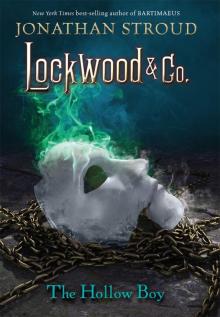 The Hollow Boy
The Hollow Boy The Last Siege
The Last Siege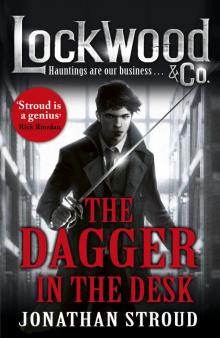 The Dagger in the Desk
The Dagger in the Desk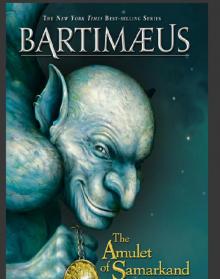 The Amulet of Samarkand
The Amulet of Samarkand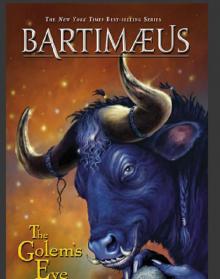 The Golem's Eye
The Golem's Eye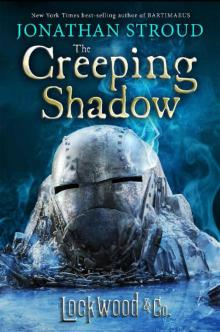 The Screaming Staircase
The Screaming Staircase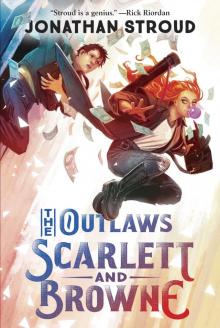 The Outlaws Scarlett and Browne
The Outlaws Scarlett and Browne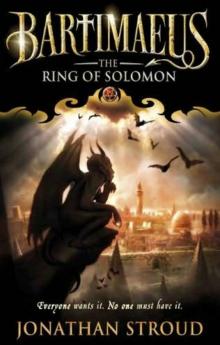 The Ring of Solomon: A Bartimaeus Novel
The Ring of Solomon: A Bartimaeus Novel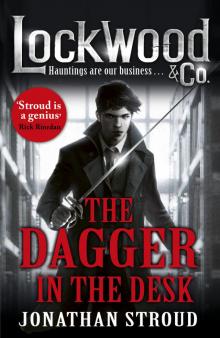 Lockwood & Co
Lockwood & Co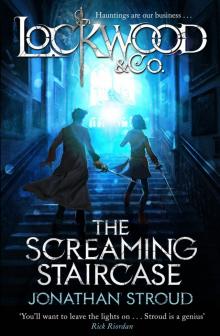 Lockwood & Co: The Screaming Staircase
Lockwood & Co: The Screaming Staircase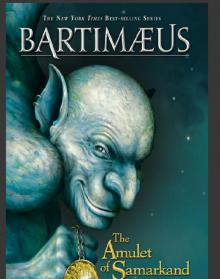 Bartimaeus: The Amulet of Samarkand
Bartimaeus: The Amulet of Samarkand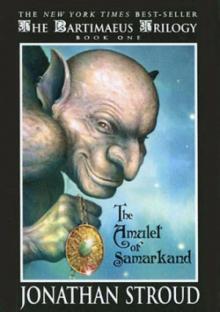 The Amulet of Samarkand tbt-1
The Amulet of Samarkand tbt-1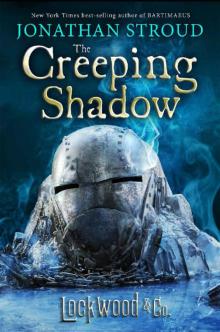 Lockwood & Co.: The Creeping Shadow
Lockwood & Co.: The Creeping Shadow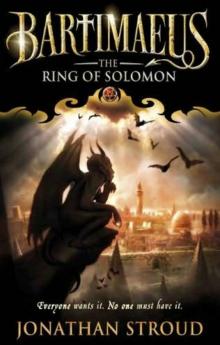 The Ring of Solomon
The Ring of Solomon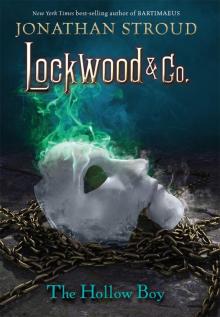 Lockwood & Co. Book Three: The Hollow Boy
Lockwood & Co. Book Three: The Hollow Boy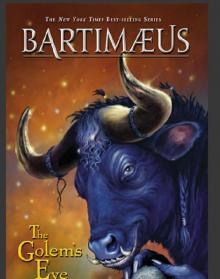 Bartimaeus: The Golem’s Eye
Bartimaeus: The Golem’s Eye